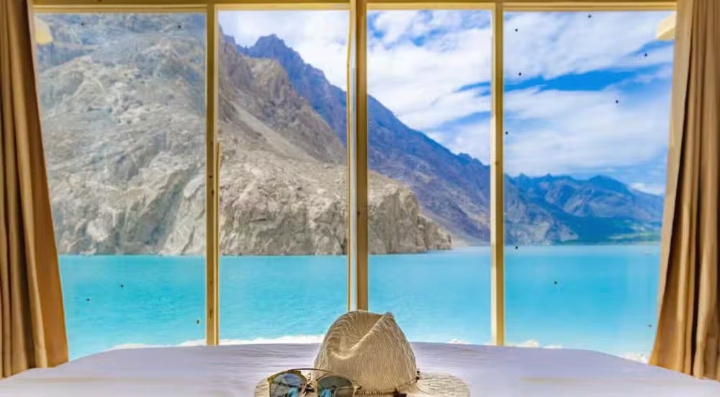Hunza, Gilgit-Baltistan – June 2025**:
In a major environmental and tourism-related development, authorities in Hunza have *sealed a well-known hotel* after a foreign vlogger posted a video exposing serious pollution in a nearby lake, allegedly caused by the hotel’s mismanagement of waste.
The incident has triggered a wave of concern across Pakistan’s tourism sector, especially in scenic regions like Hunza, which rely heavily on eco-tourism and natural beauty to attract local and international visitors.
📹 The Viral Video That Sparked Action
A well-followed foreign travel vlogger, known for documenting his eco-tourism experiences, recently visited the Hunza region and stayed at a luxury hotel situated close to a pristine lake popular among tourists.
In his now-viral YouTube video, the vlogger can be seen expressing shock and disappointment after discovering plastic waste, used food containers, and untreated sewage trickling from the hotel’s drainage into the lake. He describes the sight as “heartbreaking,” especially given Hunza’s global reputation as a clean and untouched natural paradise.
Within 48 hours of the video’s release, it had amassed over 2 million views, drawing public outrage and pressure on local authorities to investigate.
🏛️ Local Authorities Respond Swiftly
In response to public pressure and growing media coverage, the Gilgit-Baltistan Environmental Protection Agency (GB-EPA) conducted a surprise inspection. Officials confirmed that the hotel had failed to comply with environmental safety protocols, and its sewage disposal system was directly contaminating the lake water.
✅ Key Findings from the Inspection:
- No proper waste filtration system in place.
- Raw sewage found flowing into the lake.
- Plastic and non-biodegradable items scattered around the hotel perimeter.
- Lack of awareness or training among hotel staff on eco-friendly practices.
Based on these violations, authorities sealed the hotel premises, issued heavy fines, and announced a review of other hotels and tourist spots in the region to prevent similar environmental negligence.
🌍 Public Reaction: Applause and Anger
The vlogger’s exposé has triggered a broader conversation on responsible tourism, both among travelers and hospitality businesses in Pakistan.
- Environmental activists have applauded the swift action and demanded stricter policies to protect Pakistan’s fragile northern ecosystems.
- Locals and tourists alike have expressed disappointment, fearing that such actions could damage Hunza’s image as a pristine getaway.
- Many social media users are calling for mandatory environmental audits for all hotels near lakes, rivers, and other sensitive ecological zones.
💬 What the Hotel Management Said
The hotel’s management issued a public apology, claiming the pollution was due to a “technical fault” and not intentional neglect. They also promised to install modern waste management systems and participate in community clean-up drives.
However, critics argue that negligence cannot be excused, especially when tourism in Pakistan is booming and sustainability practices should be at the core of hospitality operations.
✈️ Why This Matters for Pakistan’s Tourism Future
Pakistan’s tourism industry has been witnessing steady growth, with Hunza Valley being one of the top destinations. The region draws thousands of tourists yearly for its mountains, lakes, and cultural heritage.
But with increased tourist footfall comes increased responsibility. Incidents like this highlight the urgent need for eco-regulations, sustainable infrastructure, and environmental education.
If ignored, pollution can not only damage the ecosystem but also jeopardize the livelihood of locals and the reputation of tourism in Pakistan as a whole.
📝 Final Thoughts
This incident serves as a wake-up call to all stakeholders — from hotel owners and local governments to travelers themselves. Protecting our natural heritage is not optional; it is the backbone of tourism and the key to ensuring that future generations can enjoy the same beauty that draws visitors today.
Let this be a moment of reflection and reform, not just for Hunza, but for all of Pakistan’s treasured natural spots.

